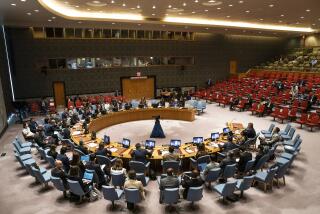Soviet Grain Output Least Since 1985 : Shortfall Raises Fears That Reforms Can’t Meet Expectations
- Share via
MOSCOW — The Soviet Union today said its grain harvest last year was the worst since 1985, underlining fears expressed by Soviet President Mikhail S. Gorbachev that food production has bogged down.
Stepan Sitaryan, first deputy chairman of the State Planning Committee, told a news conference the 1988 harvest was 195 million tons, according to provisional figures, down from 211 million tons the previous year.
The harvest also fell short of a target of 235 million tons in the 1988 state plan. It will mean more buying on the world market by the Soviet Union, the biggest importer.
Moscow agreed with the United States in November to buy an annual minimum of 9 million tons of U.S. grain for the next two years, but London traders said Soviet orders for this year already have exceeded that.
The harvest also underlines the gravity of the problems, particularly in agriculture, faced by Gorbachev who hopes that economic reform will complement the political changes he is making.
Gap in Expectations
Shortages of food and consumer goods have led to fears that promises of higher living standards under perestroika , or economic restructuring, may have created an expectations gap that cannot easily be filled.
Gorbachev wants to get more meat on Soviet tables but needs rising volumes of feed grain to achieve that.
He said this month that there is a need to end “deformations” in food production and that failure to get results could weaken support for political reform.
“Food supply (is) one of the most important problems we need to solve under the conditions of perestroika, because, to speak plainly, it has become bogged down,” he said.
He urged that immediate steps be taken to protect those taking advantage of new rules that allow farmers to lease land.
Critics say the new and, in effect, private peasant farmers are being obstructed by red tape and hostility from the state and collective farms with which they must work.
“With one hand they are continuing to grant the peasant ‘freedom’ and appeal to his sense of being a master,” wrote leading commentator Alexander Bovin in the weekly Moscow News.
“With the other they flood collective and state farms with papers, tightly swaddle leaseholders, trample underfoot any sprout of a farmer’s spirit.”
More to Read
Sign up for Essential California
The most important California stories and recommendations in your inbox every morning.
You may occasionally receive promotional content from the Los Angeles Times.













